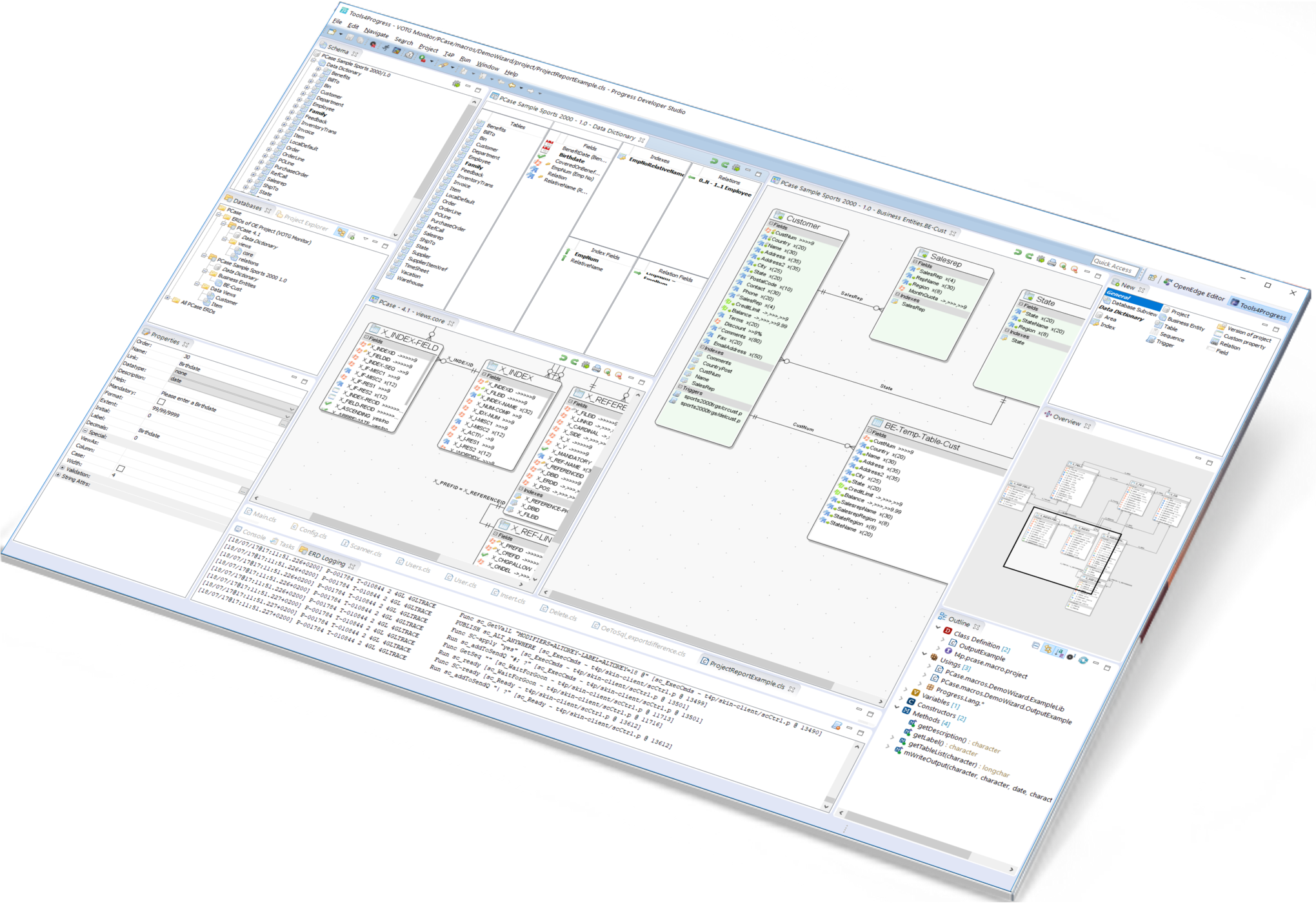We offer a free presentation with demo via internet, it will take only 1 h of your time. Please send a mail to of-1@iap.de or call +49 (0) 40 – 30 68 03 – 0.
Integrated OpenEdge ERD Modeler
PCase is a professional ERD modeler for OpenEdge Databases and fully integrated into the OpenEdge Studio. It allows import, create and maintain database versions, document the structure and generate ABL code from DB structure.
DB Design
PCase is the better Data Dictionary, with DB visualization, fast access to all entities (Table, Fields, Indexes…), table relations and project meta data.
Generate
ABL macros enable powerful code generation from DB structures. The possibilities are limitless: Business Entities, SQL DDL, JSON, ABL classes...
Document
PCase helps a lot to document the DB with tables, table relations, subviews, HTML reports… This is helpful for developers and the customer.
Learn More
There is detailed information about PCase available. This could be explored via the HowTos, YouTube videos, help file, version history and articles.
Are you interested?
EXPLORE IAP'S TOOLS4PROGRESS
The Tools4Progress (PCase, Skin-Client, Viper) are created for Progress OpenEdge.
These tools extend the abilities of OpenEdge in a practical way:
OF-1 is the Multi-UI/UX Low-Code Development Platform for OpenEdge.
Skin-Client enables you to modernize and extend your Progress application.
Skin-Client Mobile enables App creation without device-specific languages or development environments.
Viper brings a programmable 4GL/ABL printing system, which is OS independent.
Maintain OpenEdge Databases
PCase is the better Data Dictionary, with DB visualization, fast access to all entities (Table, Fields, Indexes…), table relations and project meta data.
PCase is fully integrated into the OpenEdge Studio. It supports the full range of DB structure administration processes in a user friendly, wizard based way. Loading schemes via DB connect or from .df file as DB model (in PCase called a project) makes an inventory of existing DBs. For new projects, PCase starts with an empty worksheet.
The project can completely maintained in PCase, all physical and logical OE DB structures can be handled. Two project versions, two projects or a project and an OpenEdge DB can be compared. The changes (add, delete, change) then will be displayed in a clear tree structure. A DB structure can be updated on line.
Powerful ABL Macro Support
ABL macros enable powerful code generation from DB structures. The possibilities are limitless: Business Entities, SQL DDL, JSON, ABL classes...
The schema and meta schema of a database contains very valuable information. This information can be used as a bridge between the DB and the application, in form of generated code and mappings. Customer use the macros generate: Trigger, Business Entity creation, schema export for third party products, Temp-Table and DataSet declaration, SQL DDL creation and much more.
PCase has numerous level of these information which are on the OpenEdge 'physical' level (Tables, Fields, Areas…) and on 'logical' levels (Projects, Sub-views, Relations, Custom properties…). On any of these levels macros can be activated via the macro start button. These macros are OpenEdge ABL classes.
Documentation and Project Organization
Proven strategies for application modernization (from Character, Standard Progress Client/Server, ADMx, DWP, Dynamics…) are ready to use.
Most databases in the OpenEdge world are mature DBs, so first goal of using PCase is often documentation. The import process put all tables in the default Sub-View, which is called "Data Dictionary". Typical OpenEdge systems in the market have 200 (CRM) to 2000 (ERP) tables. Arranging that much tables in a diagram is a futile attempt.
Organizing a larger DB in PCase starts with creation of Sub-Views. Then adding table relations will show how the tables are connected. PCase allows any kind of table relations, including some irregular. to allow the representation of real world databases. Examples are different field types [e.g. charfield = intfield], value relations [e.g. cust.type = "A"] or expression relations [e.g. cust.num = int(substring(somestrangecode, 4,6))].
Learn More
Becoming more familiar with OF-1 (demos, workshops, PoC, training...) helps to make the right choice and finally the customer is able to work independently.
Starting with PCase is simple: download, installation and then work with PCase. Even in an unregistered version of PCase most tasks can be done, and for testing purposes we offer a cost free time limited license.
There are various resources for PCase:
- PCase First Steps: Local installed PDF, describing installation, project setup and some basic processes (available here).
- Help: Local installed HTML help, describing mechanisms, concepts and possibilities. The HTML help is online readable here.
- Article: This article describes how to set up PCase and an OpenEdge project to develop macros.
- YouTube Channel: The videos covers concepts and tasks. They show the stand alone version of PCase, but the concept is still the same.
- Version History: Lists the changes in PCase from version to version.
Stay Updated
PCase is being constantly developed. You either can see the version history of PCase here or stay updated by a newsletter subscription (less than 10 letters per year).










